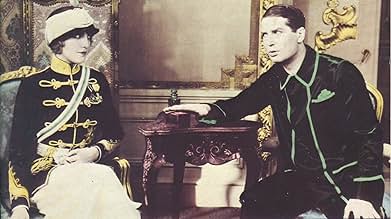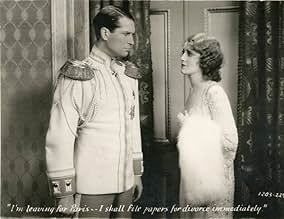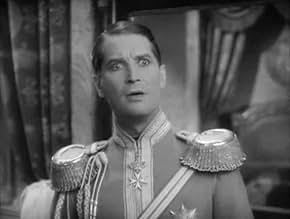ÉVALUATION IMDb
7,0/10
2,8 k
MA NOTE
La reine de la mythique Sylvanie épouse un courtisan, qui trouve sa nouvelle vie insatisfaisante.La reine de la mythique Sylvanie épouse un courtisan, qui trouve sa nouvelle vie insatisfaisante.La reine de la mythique Sylvanie épouse un courtisan, qui trouve sa nouvelle vie insatisfaisante.
- Nommé pour 6 oscars
- 4 victoires et 6 nominations au total
Carl Stockdale
- The Admiral
- (as Carlton Stockdale)
Albert De Winton
- Cabinet Minister
- (as Albert de Winton)
Avis en vedette
THE LOVE PARADE (Paramount, 1929) directed by Ernst Lubitsch, stars Maurice Chevalier in his second Hollywood musical (the first being 1929s "Innocents of Paris") and his first of four opposite Jeanette MacDonald in her screen debut. Jeanette plays Queen Louise of the Kingdom of Sylvania who immediately falls in love with Count Alfred Renard, a popular ladies' man, and soon marries this Parisian emissary in order to negotiate a loan from foreign power. After they wed, Alfred soon finds married life isn't what he has hoped, having to take orders from his wife as well as being second fiddle around the kingdom.
In spite of its age, THE LOVE PARADE is still quite entertaining early sound musical, consisted mostly of songs and limited dancing. With score composed by Victor Schewrtzinger and Clifford Grey, songs include, "Oo-La-La-La-La" (sung by Lupino Lane); "Paris, Stay the Same" (sung by Maurice Chevalier); "Dream Lover" (sung by Jeanette MacDonald/ ladies-in-waiting); "Anything to Please the Queen" and "My Love Parade" both sung by Chevalier and MacDonald); "Dream Lover" (reprise by MacDonald); "Let's Be Common" (sung by Lupino Lane and Lillian Roth); "The March of the Grenadiers" (sung by MacDonald); "Nobody's Using It Now" (sung by Chevalier); "The Queen is Always Right" (recited by Roth and Lane/ staff); "Dream Lover" (reprise by MacDonald); "March of the Grenadiers" (reprise by soldiers); and "My Love Parade" (reprised by MacDonald and Chevalier).
Running ten minutes shy of two hours, THE LOVE PARADE was nominated for an Academy Award as Best Picture, with Chevalier's nomination for Best Actor, but no wins. Other members of the cast consist of Eugene Palette, Edgar Norton, Ethel Griffies and Lionel Bellmore. Look fast for silent comic Ben Turpin in a funny bit; and future film stars as Virginia Bruce as the lady-in-waiting, and Jean Harlow as one of the patrons in the ballet theater.
Formerly presented on the American Movie Classics cable channel (January 1989-September 1996), AMC's host, Bob Dorian, noted an interesting piece of trivia that THE LOVE PARADE was the only movie in which Jeanette MacDonald smoked a cigarette on screen. Finally distributed to DVD in 2009, THE LOVE PARADE returned to cable television broadcasting once again, being Turner Classic Movies where it premiered February 3, 2010, with added bonus of two minute exit music in its fadeout.
Full of comedy wit and unexpected surprises in the Ernst Lubitch tradition, THE LOVE PARADE is still worthy film study and entertainment value after all these years. (***)
In spite of its age, THE LOVE PARADE is still quite entertaining early sound musical, consisted mostly of songs and limited dancing. With score composed by Victor Schewrtzinger and Clifford Grey, songs include, "Oo-La-La-La-La" (sung by Lupino Lane); "Paris, Stay the Same" (sung by Maurice Chevalier); "Dream Lover" (sung by Jeanette MacDonald/ ladies-in-waiting); "Anything to Please the Queen" and "My Love Parade" both sung by Chevalier and MacDonald); "Dream Lover" (reprise by MacDonald); "Let's Be Common" (sung by Lupino Lane and Lillian Roth); "The March of the Grenadiers" (sung by MacDonald); "Nobody's Using It Now" (sung by Chevalier); "The Queen is Always Right" (recited by Roth and Lane/ staff); "Dream Lover" (reprise by MacDonald); "March of the Grenadiers" (reprise by soldiers); and "My Love Parade" (reprised by MacDonald and Chevalier).
Running ten minutes shy of two hours, THE LOVE PARADE was nominated for an Academy Award as Best Picture, with Chevalier's nomination for Best Actor, but no wins. Other members of the cast consist of Eugene Palette, Edgar Norton, Ethel Griffies and Lionel Bellmore. Look fast for silent comic Ben Turpin in a funny bit; and future film stars as Virginia Bruce as the lady-in-waiting, and Jean Harlow as one of the patrons in the ballet theater.
Formerly presented on the American Movie Classics cable channel (January 1989-September 1996), AMC's host, Bob Dorian, noted an interesting piece of trivia that THE LOVE PARADE was the only movie in which Jeanette MacDonald smoked a cigarette on screen. Finally distributed to DVD in 2009, THE LOVE PARADE returned to cable television broadcasting once again, being Turner Classic Movies where it premiered February 3, 2010, with added bonus of two minute exit music in its fadeout.
Full of comedy wit and unexpected surprises in the Ernst Lubitch tradition, THE LOVE PARADE is still worthy film study and entertainment value after all these years. (***)
It was really the film that established Maurice Chevalier and Jeanette MacDonald as a musical comedy team - the first one of the American talkie period. They would make four films in the end (THE LOVE PARADE, ONE HOUR WITH YOU, LOVE ME TONIGHT, and THE MERRY WIDOW). Four first rate early musicals... and they did not like each other! Jeanette rebuffed Chevalier's attempts at a closer relationship (she only liked Gene Raymond, whom she later married). He considered her a prude and hypocrite as a result. So, despite their stunning screen chemistry and string of successes their partnership faded. Nelson Eddy was waiting in the wings for her to find the proper partner.
Chevalier is a Count who has been returned from a diplomatic post for a sexual scandal. The country is ruled by Queen Jeanette, and when she meets the charming Maurice she falls for him. They marry, but he finds that (under the guidance of her Prime Minister - Lionel Belmore - and his cabinet) she puts him aside on matters of ruling the state. Chevalier, normally the aggressor in sexual matters and in putting his own ideas out, does not like the self-image of being the boy-toy husband of the ruler of his native country. His idea would be more like that of Prince Albert, Queen Victoria's husband, who became her chief adviser on political matters after their marriage. Here, however, while everyone is polite to him, they make it clear that constitutionally he is not to be involved in running the government.
The film is a charming one - full of those "Lubitsch touches". For example, Chevalier's growing anger and impatience at his political uselessness is first shown when he asks one of the courtiers (who has just politely put him in his place), "Do you understand French?" "No, I'm afraid I don't.", says the courtier. Chevalier, with perfect timing, shoots out a long, furious diatribe of French, which one can tell is gutter language, to show his fury at his position - much to the dismay of the courtier. Later on, when the Prime Minister also puts down Chevalier's attempts at advice, he smiles and asks the Prime Minister, "Excuse me, but do you speak French?" Belmore looks at him puzzled, "Yes I do speak French." With an eat dirt smile, Chevalier says, "What a pity!" In the end, it is a financial crisis (which with typical Lubitsch humor can only depend on the foreign investors in Sylvanian securities, all of whom have to observe the reactions of the Afghan Ambassador - bearded Russ Powell - to a court function) that gives Chevalier his chance. Chevalier will only show his true love for his wife if she and the cabinet give him a voice in public affairs like Prince Albert had. And they give in.
It would not be the last visit Hollywood paid to Sylvania. Unlike other Balkan pseudo-states, it actually reappeared four years later, though under more "sinister" circumstances. In 1933 the Sylvanian Ambassador to a neighboring country tried to use underhanded means to bring about it's annexation by his homeland. However, Ambassador Trentino (Louis Calhern) did not count upon the Dictator of Freedonia (Rufus T. Firefly - Groucho Marx) and his three brothers to force him to surrender in a barrage of vegetables and fruit in DUCK SOUP.
Chevalier is a Count who has been returned from a diplomatic post for a sexual scandal. The country is ruled by Queen Jeanette, and when she meets the charming Maurice she falls for him. They marry, but he finds that (under the guidance of her Prime Minister - Lionel Belmore - and his cabinet) she puts him aside on matters of ruling the state. Chevalier, normally the aggressor in sexual matters and in putting his own ideas out, does not like the self-image of being the boy-toy husband of the ruler of his native country. His idea would be more like that of Prince Albert, Queen Victoria's husband, who became her chief adviser on political matters after their marriage. Here, however, while everyone is polite to him, they make it clear that constitutionally he is not to be involved in running the government.
The film is a charming one - full of those "Lubitsch touches". For example, Chevalier's growing anger and impatience at his political uselessness is first shown when he asks one of the courtiers (who has just politely put him in his place), "Do you understand French?" "No, I'm afraid I don't.", says the courtier. Chevalier, with perfect timing, shoots out a long, furious diatribe of French, which one can tell is gutter language, to show his fury at his position - much to the dismay of the courtier. Later on, when the Prime Minister also puts down Chevalier's attempts at advice, he smiles and asks the Prime Minister, "Excuse me, but do you speak French?" Belmore looks at him puzzled, "Yes I do speak French." With an eat dirt smile, Chevalier says, "What a pity!" In the end, it is a financial crisis (which with typical Lubitsch humor can only depend on the foreign investors in Sylvanian securities, all of whom have to observe the reactions of the Afghan Ambassador - bearded Russ Powell - to a court function) that gives Chevalier his chance. Chevalier will only show his true love for his wife if she and the cabinet give him a voice in public affairs like Prince Albert had. And they give in.
It would not be the last visit Hollywood paid to Sylvania. Unlike other Balkan pseudo-states, it actually reappeared four years later, though under more "sinister" circumstances. In 1933 the Sylvanian Ambassador to a neighboring country tried to use underhanded means to bring about it's annexation by his homeland. However, Ambassador Trentino (Louis Calhern) did not count upon the Dictator of Freedonia (Rufus T. Firefly - Groucho Marx) and his three brothers to force him to surrender in a barrage of vegetables and fruit in DUCK SOUP.
the sort of film that filmmakers to day are unable to make. it is too simple for them. it has a story with a beginning, middle and end. far too simple for the current crop of genius. the stars were real stars i swear they sometimes glittered. the directors famous touch was in fine form and even after many years i can remember walking home in a romantic glow. could anyone do the same after watching one of to days EPICS. i agree there must have been sound faults and other technical problems though i do not remember them. later on i heard a radio version also enjoyed. like far too many films of the past the love parade is unavailable to us on video or DVD. it may have been damaged and no longer usable though i do hope not. if there is any way to urge the current copyright owners to re-issue the film i would certainly like to be involved. are there other enthusiasts out there who agree?
An early musical (Ernst Lubitsch's first talkie), so the sound can be hard on the ears (especially Jeanette MacDonald's high notes). The plot as such is forgettable, but see it for the performances.
It seems odd to match Jeanette MacDonald's operetta singing with Maurice Chevalier's cabaret, but each gets their own numbers and they join in the middle for duets.
Lupino Lane and Lillian Roth do two wonderful vaudeville style song and dance numbers.
It seems odd to match Jeanette MacDonald's operetta singing with Maurice Chevalier's cabaret, but each gets their own numbers and they join in the middle for duets.
Lupino Lane and Lillian Roth do two wonderful vaudeville style song and dance numbers.
"Anything for the Queen" will be my new motto around the household, specifically for my bf. It is good to see that you can learn something from 82+ years ago for the first time.
I've always been a fan of 30's musicals so it was a treat to see this movie for the first time of my life as a historical piece, but also to see the development of musical movies from the start. I am blessed to live within 30 miles of the Stanford Theater in Palo Alto, CA that offers amazing film histories, museum and revivals every week of the year.
I can now see why Chevalier was such a hit -- he had natural wit, humor and timing, something I never witnessed in later films (such as Gigi) where his talents were mostly condensed down to singing.
Jeanette McDonald's operatic singing was extraordinary, but does feel "dated" in the film in contrast to the impeccable performances, timing, dance and humor-filled vaudevillian routines of Lupino Lane and Lillian Roth. IMO they stole the show (sort of like a 'Jack & Karen' team did from "Will & Grace").
I would see the movie again just to check out the servant scenes and a well-deserved nod to the animal trainer for the dog performances. The entire cinema was laughing at the opening goodbye to Paris scene.
I've always been a fan of 30's musicals so it was a treat to see this movie for the first time of my life as a historical piece, but also to see the development of musical movies from the start. I am blessed to live within 30 miles of the Stanford Theater in Palo Alto, CA that offers amazing film histories, museum and revivals every week of the year.
I can now see why Chevalier was such a hit -- he had natural wit, humor and timing, something I never witnessed in later films (such as Gigi) where his talents were mostly condensed down to singing.
Jeanette McDonald's operatic singing was extraordinary, but does feel "dated" in the film in contrast to the impeccable performances, timing, dance and humor-filled vaudevillian routines of Lupino Lane and Lillian Roth. IMO they stole the show (sort of like a 'Jack & Karen' team did from "Will & Grace").
I would see the movie again just to check out the servant scenes and a well-deserved nod to the animal trainer for the dog performances. The entire cinema was laughing at the opening goodbye to Paris scene.
Le saviez-vous
- AnecdotesConsidered by many to be the first musical film in which the songs were integrated with the story.
- GaffesThe fact that Count Alfred (Maurice Chevalier) speaks with a French accent, even though he is not supposed to be French, is really not an "error". However, by adding a scene to attempt to explain this anomaly, it only serves to highlight the accent discrepancies in the casting. For instance, in contrast to the accent discrepancy with Chevalier's character, no one seems to notice that his French servant, Jacques (Lupino Lane), speaks British English with no discernible French accent.
- Citations
Queen Louise: Why am I always awakened from my dreams?
- Autres versionsThere is an Italian edition of this film on DVD, distributed by DNA Srl: "IL PRINCIPE CONSORTE (1929) + AMAMI STANOTTE (1932)" (2 Films on a single DVD), re-edited with the contribution of film historian Riccardo Cusin. This version is also available for streaming on some platforms.
- ConnexionsFeatured in The Love Goddesses (1965)
Meilleurs choix
Connectez-vous pour évaluer et surveiller les recommandations personnalisées
- How long is The Love Parade?Propulsé par Alexa
Détails
- Date de sortie
- Pays d’origine
- Langues
- Aussi connu sous le nom de
- Aşk Resmigeçidi
- Lieux de tournage
- société de production
- Consultez plus de crédits d'entreprise sur IMDbPro
Box-office
- Budget
- 650 000 $ US (estimation)
- Durée
- 1h 47m(107 min)
- Couleur
Contribuer à cette page
Suggérer une modification ou ajouter du contenu manquant


































